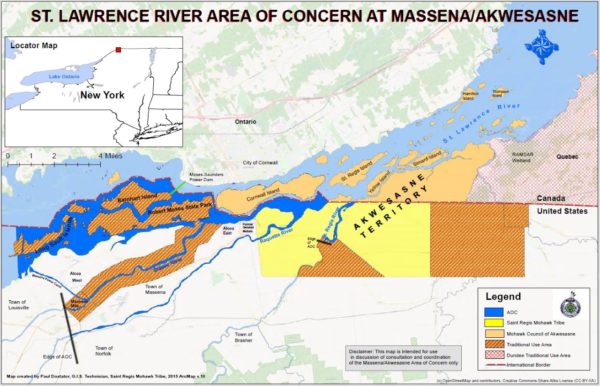
- Details
- By Native News Online Staff
Unique St. Lawrence River Restoration Joint Coordination Will Benefit Region’s Ecosystem and Cultures
MASSENA, N.Y. — The Saint Regis Mohawk Tribe and the New York State Department of Environmental Conservation (DEC) signed a history-making agreement to restore natural and cultural resources in upstate New York near the Canadian border.
The tribe and New York government agency said the historic cooperative agreement calls for accelerated restoration of natural resources and traditional Native American uses within the St. Lawrence River Area of Concern near the Mohawk’s tribal lands, Akwesasne Territory, and Massena, New York.
The agreement is a first-of-its-kind across the United States portion of the Great Lakes and provides a roadmap for coordinating studies and restoring natural and cultural resource uses between the two government agencies, while recognizing their unique jurisdictions and shared interests, according to a news release distributed on Wednesday, January 22, 2020.
When the Area of Concern was first identified in 1987, the Saint Regis Mohawk Tribe voiced the need to have Akwesasne recognized as an equal partner in remediating the serious environmental pollution inflicted upon our territory, according to a statement from the Saint Regis Mohawk Tribal Council.
The work to finalize this cooperative agreement took several months.
“The formalization of this agreement is the culmination of a new, exciting, and historic partnership between the Saint Regis Mohawk Tribal Council and New York State,” said DEC Commissioner Basil Seggos.
Areas of Concern are geographic areas around the Great Lakes that are environmentally degraded.
In 1987, the Great Lakes Water Quality Agreement designated 43 AOCs in order to focus restoration work on these areas. The Massena area of the St. Lawrence River was originally listed as an AOC because of elevated levels of heavy metals and PCBs in sediments, wildlife, and water samples collected in the lower Grasse, Raquette, and St. Regis rivers. Significant progress is being made in remediating and restoring these waters, but more work remains.
The agreement also includes the formal renaming of this unique location from the “St. Lawrence River at Massena” to the “St. Lawrence River Area of Concern at Massena/Akwesasne” to identify the efforts of the Mohawk governments at Akwesasne to protect and enhance the water quality of territorial waterways. A new map has been developed that captures the extent of the Akwesasne Territory and identifies traditional use areas within the Area of Concern.
More Stories Like This
Native News Weekly (August 25, 2024): D.C. BriefsNavajo Nation Mourns the Passing of Former Vice President Rex Lee Jim
Deb Haaland Earns Endorsement From Communications Workers of America Local 7076
University Soccer Standout Leads by Example
Two Native Americans Named to Democratic Congressional Campaign Committee's“Red to Blue” Program
Help us defend tribal sovereignty.
At Native News Online, our mission is rooted in telling the stories that strengthen sovereignty and uplift Indigenous voices — not just at year’s end, but every single day.
Because of your generosity last year, we were able to keep our reporters on the ground in tribal communities, at national gatherings and in the halls of Congress — covering the issues that matter most to Indian Country: sovereignty, culture, education, health and economic opportunity.
That support sustained us through a tough year in 2025. Now, as we look to the year ahead, we need your help right now to ensure warrior journalism remains strong — reporting that defends tribal sovereignty, amplifies Native truth, and holds power accountable.
 The stakes couldn't be higher. Your support keeps Native voices heard, Native stories told and Native sovereignty defended.
The stakes couldn't be higher. Your support keeps Native voices heard, Native stories told and Native sovereignty defended.
Stand with Warrior Journalism today.
Levi Rickert (Potawatomi), Editor & Publisher

